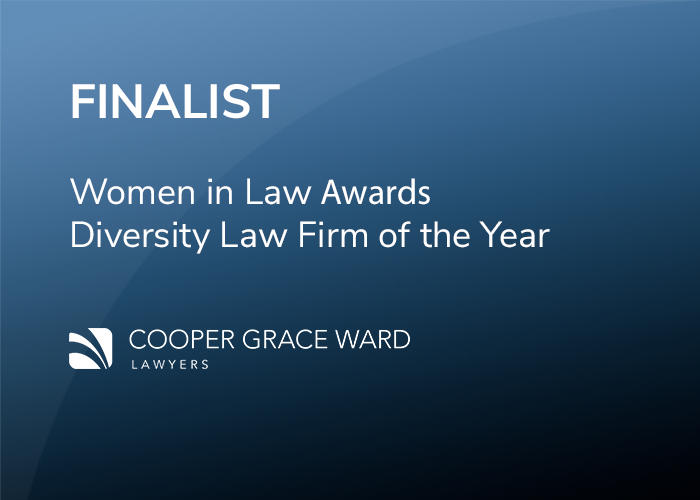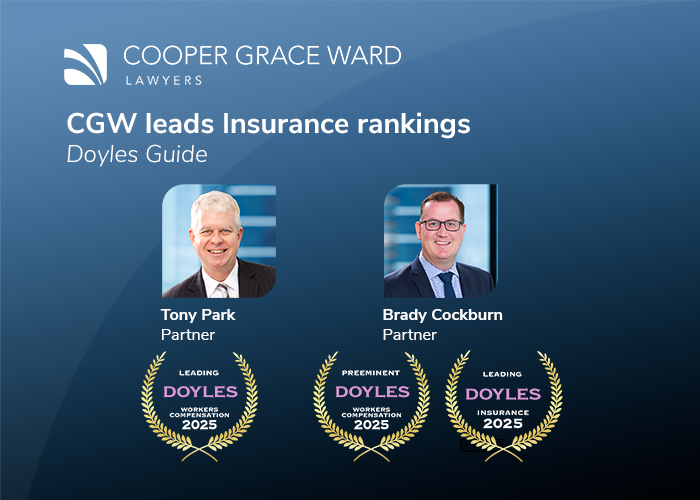In the recent decision of Lane (Trustee), in the matter of Lee (Bankrupt) v Deputy Commissioner of Taxation [2017] FCA 953, Cooper Grace Ward acted for the trustee in bankruptcy, who sought directions from the Court regarding the administration of a trading trust where the bankrupt was the trustee.
Facts
- The bankrupt, Mr Lee, had carried on business as trustee of a trust.
- The assets of the trust were insufficient to pay the creditors of the trust.
- In relation to the trust, the ATO sought priority for the superannuation guarantee charge (SGC) under section 109(1)(e) of the Bankruptcy Act 1966 (Cth). The SGC was in relation to the employees of the business carried on by Mr Lee as trustee.
- Not all of the trust creditors were creditors in the bankrupt estate.
- There were creditors of the bankrupt estate who were not creditors of the trust.
- The assets of the bankrupt estate were insufficient to pay the creditors entitled to prove in the bankrupt estate.
The issues
Directions were sought in relation to the following matters:
- Were non-trust creditors entitled to share with trust creditors in the funds of the trust the subject of Mr Lee’s right of exoneration as trustee of the trust?
- If non-trust creditors could not share with trust creditors in the funds the subject of the right of exoneration, whether:
- the right of exoneration in favour of the trust creditors should be administered prior to the bankrupt estate;
- the priority provision (section 109(1)(e) of the Bankruptcy Act) applied to the trust;
- if the priority provision did not apply, trust creditors would take pari passu from the trust funds the subject of the right of exoneration;
- non-trust creditors were entitled to priority in the bankrupt estate in preference to trust creditors until non-trust creditors had received a dividend equal to the dividend that trust creditors would receive out of the trust funds the subject of the right of exoneration (known as the hotchpot principle).
Exoneration is the right of a trustee to apply trust assets in payment of undischarged liabilities incurred as trustee. The right of exoneration forms part of the personal property of the insolvent trustee, which passes to the bankruptcy trustee.
The hotchpot principle is a reflection of the maxim ‘equality is equity’. This requires equal treatment of creditors so that each ranks pari passu with all creditors of the same class.
The decision
In Lee it was held:
- only the trust creditors could share in the trust funds the subject of the right of exoneration;
- the trust was to be administered prior to the administration of the bankrupt’s estate;
- the priority provision under the Bankruptcy Act for the payment of SGC did not apply to the trust;
- the creditors of the trust would share pari passu;
- the rights of the trust creditors to benefit from the personal estate of the bankrupt trustee were to be deferred until the non-trust creditors had received the same proportionate payment as the trust creditors had received from the right of exoneration in respect to the trust; and
- in the distribution of the proceeds of the bankrupt’s property under sections 108 and 109 of the Bankruptcy Act the hotchpot principle applied such that the trust creditors had to bring into account the amounts that they had received by application of the right of exoneration, prior to participating in the distribution.
Issues regarding application of the hotchpot principle
Significantly in Lee it was held that the hotchpot principle applies to both sections 108 and 109 of the Bankruptcy Act.
For example, if the ATO receives a pari passu payment from a trust in relation to SGC, the ATO would have to account for the SGC payment received from the trust when calculating its SGC priority under section 109(e) of Bankruptcy Act.
It is noted that Lee only dealt with a bankrupt trustee. However, there is the issue as to whether the hotchpot principle is also applicable to a corporate trustee that is in liquidation where there are trust assets and non-trust assets and trust creditors and non-trust creditors. If the hotchpot principle applies to non-trust assets of the corporate trustee, is it subject to the priorities in section 556 of the Corporations Act 2001 (Cth)?
It will be a matter of awaiting further decisions from the Court as to the scope and application of the hotchpot principle.
If you would like more information about these issues, please contact Graham Roberts, Partner on 07 3231 2404.






